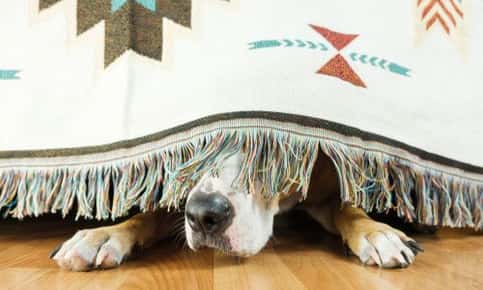
How to Calm an Anxious Pet
Does your pet cower in fear during thunderstorms or hate to be alone? Although it doesn't seem fair, anxiety isn't just a human problem but can affect animals too. Fortunately, there are a few steps you can take to decrease your pet's anxiety.
Anxiety Triggers
Identifying your pet's triggers can help you create a strategy to calm your dog, cat or rabbit. Triggers vary from animal to animal and may include:
- Loud Sounds: Vacuum cleaners, fireworks, thunder, and other sounds can be particularly frightening to some pets.
- New People or Animals: Exposure to unfamiliar animals and people may increase anxiety symptoms in some pets.
- Change in Routine: Moving, bringing a new person or pet into your household, or even changing your work schedule may be the catalyst for your pet's anxiety symptoms.
- Visits to the Veterinarian: Some pets are overwhelmed by the unfamiliar sights, sounds, and smells at the veterinary office or feel threatened by the other animals in the waiting area.
- Certain Surfaces: Does your pet resist walking on marble, hardwood, laminate or types of smooth flooring? He or she may be afraid of falling or may have been scolded after walking on a particular type of floor in the past.
- Separation: Separation anxiety is particularly common among pets, affecting 14 percent of dogs, according to the American Kennel Club.
- Aging: Pets that have cognitive dysfunction syndrome, a condition similar to dementia in people, may develop anxiety.
Signs of Anxiety in Pets
Anxious pets may lash out if they're afraid of a person, animal or object. Your pet may express fear by growling, barking, hissing, biting or scratching.
Just like people, animals can lose control of their bowels or bladder if they're extremely anxious or fearful. If you've ever returned home and discovered that your housetrained dog or cat had an accident, separation anxiety may be to blame. Anxious pets can also be destructive. Social media is full of videos and photographs of mangled couch cushions, gouged doors, and overturned plants.
Anxiety can trigger frequent barking, howling, meowing, or drooling. Cats or rabbits may groom themselves excessively, causing bald or irritated spots on their skin.
How to Reduce Anxiety
These tips may help your pet feel more secure and less fearful:
- Create a Safe Space: Place your pet in a quiet room when you're vacuuming, hosting a noisy party, or meeting your best friend's new Great Dane.
- Try Pheromones: Pheromones are natural or synthetic chemicals that can calm stressed or anxious pets. Pet stores and online shopping sites sell pheromone sprays, diffusers, wipes, and collars.
- Avoid Routine Changes if Possible: Your work schedule may change, but that doesn't necessarily mean that your pet's routine must be altered. Ask another family member or roommate to feed, walk or play with your pet at the usual times. If you're going out of town, your anxious pet may be happier staying at home with a pet sitter rather than spending the time in a boarding kennel.
- Give Your Pet a Piece of Your Clothing: Decrease separation anxiety by giving your pet clothing that contains your scent.
- Buy a Calming Vest: Calming vests are a type of wrap-around jacket that calms pets by applying constant pressure to their bodies. Similar to weighted blankets for humans, calming vests help dogs and cats cope with loud noises and may also help with general anxiety.
- Make Time for Exercise: After a vigorous game of fetch or chase the laser pointer light, your pet may feel much calmer. Daily exercise is beneficial for all pets but is particularly important if your pet suffers from anxiety.
- Gradually Desensitize Your Pet to the Anxiety Trigger: Pets may become less fearful if they're gradually exposed to anxiety triggers. If your pet is afraid to walk on hardwood or laminate floors, take one or two steps into the room and offer a treat. When the fear of loud noises is the problem, play a recording of thunder or fireworks for a few seconds, then offer a treat. Discontinue this approach if your pet doesn't respond well or becomes increasingly agitated.
- Talk to Your Pet's Veterinarian: If these suggestions don't relieve your pet's anxiety, it's a good idea to consult the veterinarian. Your pet's doctor can offer suggestions, prescribe anti-anxiety medication, if needed, or make a referral to a behavioral specialist. Your pet will also receive a thorough examination to make sure that anxiety isn't related to a health condition or disease.
Are you worried about your pet's anxiety? Contact our office to schedule an appointment.
Sources:
AKC: Understanding, Preventing, and Treating Dog Anxiety, 5/14/19
Humane Society of the United States: Does Your Dog Freak Out When You Leave?

